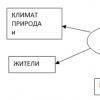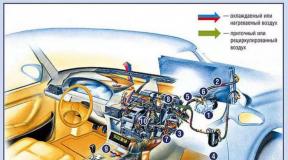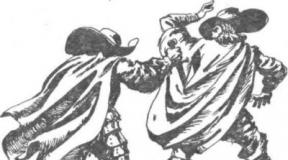What do you know about politics. Why is it important to be interested in politics and take part in it. Active citizenship
:
Politics(ancient Greek πολιτική “state activity”, from Greek πόλις “city, state”):
- Activities of public authorities and government controlled, reflecting social order and economic structure of the country.
- Issues and events of public, state life.
- In a certain way, the directed activity of the state or social groups in various areas: the economy, social and national relations, demography, security, etc.
Politics determines relations with other subjects of political interests (states, corporations, in all areas of relationships). The basis of the policy reflects constitution or master planning of large organizations with complex hierarchies and multidisciplinary branched structures. The policy of external and internal relations are interconnected and reflect the foundations of self-organization and management.
So, simply put, politics is how we live in every sense of the word.
Our main enemy is apathy and indifference
Elections were held all over Russia yesterday. They took place in different ways, but one general trend was traced - low turnout. What does this mean? And this means that voters do not believe that they can change something. Such an attitude towards the most important democratic procedure - elections was formed for a long time and diligently, breaking people's hope for fair elections. Used heavy artillery -. And electoral fraud, unequal access to the same media, black PR and other delights Russian politics are not news to anyone. There is no real opposition, all parliamentary parties vote the same way, there is no competitiveness. What do we have in the dry residue?
- rampant corruption
- economic stagnation at $120 per barrel
- capital outflow and recession in economic activity
- monopolization of everything possible
- discriminatory laws
- incoherent foreign policy
- censorship in the media, etc.
Who is to blame for what is happening now? We are with you. Yes, we are. We were told that we did not decide anything, that there was no choice, but we meekly agreed, like slaves. Meanwhile, some 30% decide our fate, choose people for us who regulate all aspects of our lives. Is it right? Of course not! How to deal with this - go to the polls, defend your votes, sign up as observers, treat elections responsibly, because the fate of the country / region / city is decided on them.
By ignoring elections, you are ignoring your future.
Why can and should we make claims to the authorities?
And everything is very simple - we support them with our taxes. After all, we make claims in the store for a bad product or service? It's the same here.
How much taxes do we pay?
So, with a certain degree of error, it can be argued that a working citizen in one form or another gives the state 50-60% of the money earned.
A tidy sum, don't you think? And so that it is not plundered, but finally normal roads are built, you should be interested in politics, it is you, and not wait for a miracle or some kind of hero. You have to become that hero for yourself.
In addition, by participating in politics, you can find like-minded people and this is very cool. I will quote the message of one girl about the Moscow elections:
The first time, tears rolled over politics. I never thought this could happen to me! You know, while the preparations for the elections were going on, I met a huge number of smart, interesting, creative people. With burning eyes, with an inner core, with a desire to go forward, to do and believe. Believe first of all in yourself. A year ago, I remember it seemed to me that in this country there is no place for people like me. I felt alone among the gray, sleepy mass. Now I know that I am far from alone. That there are people with whom I will resonate. For me, these elections are a victory, my personal one. I know that there are amazing people in my city, I know that there are many of them. I want to live among these people. This is my personal discovery, my breakthrough! Thank you for these choices!

In custody
Having scored in the elections - you have already lost, consider that your vote was stolen, you, thereby, framed your relatives and friends.
Participate in elections - choose your own future, it's easy. And for especially doubters, I will end with an anecdote:
One very religious person for 20 years every day prayed to the Lord to let him win the lottery. But his prayers were in vain. And then one day, he raised his gray head to heaven and with tears in his eyes asked the Lord:
“Oh Lord, didn’t I pray to you, didn’t I serve you, didn’t I lead a righteous life, so why don’t you give me what I have been asking for so long???
Then the heavens open and the Lord says to him
- Buy, in the end, at least one lottery ticket !!!
Before you start talking about politics, you need to know the most important thing - there are six billion people on earth who understand religion, football, cinema and politics better than you. The main thing is to let the person speak out, occasionally throwing up thoughts that, at the end of the conversation, he will sincerely consider his own, and, accordingly, you are the best interlocutor in the world.
If we leave out international affairs and take the most basic meaning of politics, then this is the relationship between government and society, which can be carried out according to different schemes. In Russia, for a long time there was only one scheme - the boss and the subordinate. Let's just say that there is nothing terrible in this. Let us add to this only a curious aphorism by P.A. Khomyakov: “You cannot be a boss in Russia if you cannot eat with appetite when your subordinates are hungry near the table.”
This is an amazingly accurate observation. The most striking thing is that people will not take seriously a boss who behaves differently. Perhaps the reason for this is the constant need to feel morally superior to his boss. Its moral superiority needs to be constantly spoken out, brought out. That is why a Russian person loves to talk about politics so much, and the whole conversation boils down to swearing at the authorities. And that is why, on the appointed day, everyone dutifully goes to the polls and votes for the ruling party.
Everyone is sure that politics is a dirty business, and they rightfully add non-participation in any kind of politics to the list of their most excellent qualities. It is in these people that the symptom of enthusiastic numbness is fully manifested in the presence of any significant representative of authority. With rapture they talk about meetings, and even proudly show their photo with Zhirinovsky. This phenomenon has been well studied. That is, the political business is dirty, but those who deal with it are living gods who have descended to earth. In the person of a politician, people worship, however, not to themselves, but to the power and money that they personify.
Are power, money and semi-divine adoration of the crowd given just like that, thanks to their own labors and abilities. The question is rhetorical and cannot be answered.
Another question that is constantly exaggerated by the patriotic media requires an urgent answer. Are politicians the same people as we are or are they a different, mutated species. For all the ridiculousness of such a question, it has the right to exist, because there is no such ardent enemy for every person as an official, who undermines everything that is good and useful for the country. Only a different form of life, masquerading as people, can behave this way.
In fact, everything is simple. Each official individually is the same person with a soul and even cultural needs. He can be a good Christian, father and husband. But when he enters the bureaucratic structure, he ceases to be himself and turns into a cog in a huge mechanism with unclear goals. Each person in it works as a simple “yes” “no” switch, and together it forms a primitive artificial intelligence whose goals are incomprehensible even to people at the top of the bureaucratic hierarchy.
On Thursday, February 8, the Ministry of Education and Science, together with the Proektoriya portal, held the All-Russian open lesson “What do you know about food?”, In which more than 18 thousand schools took part, follows from a press release received by the editorial office of the VZGLYAD newspaper.
“The new cycle of lessons on professional navigation for high school students, in fact, is a continuation of the All-Russian open lesson, which was held by the President of Russia on September 1, 2017. The main task of the lessons is to tell children about the professions that the country needs. And to tell in a modern, interesting and understandable language. These lessons are professional orientation in a new format. I think that the lessons will be interesting and understandable for the children and will be approved by the school and parent audiences,” said Olga Vasilyeva, Minister of Education and Science of Russia.
The lesson was the first of a series of upcoming open classes and part of the educational process in 18 thousand 146 schools in Russia, and schools from Krasnodar, Belgorod, Tver and Yaroslavl came to a direct connection with the lesson site - the Kinetics Prototyping Center on the basis of the National Research Technological University "MISiS". Invited experts spoke about in-demand and disappearing professions, innovations in agriculture and the knowledge necessary for a true specialist. The head of Kinetics, the famous industrial designer and futurist Vladimir Pirozhkov moderated the lesson.
Dmitry Lashin, Chairman of the Board of Directors, co-owner of the Valley of Vegetables company, was the first to address the schoolchildren. Using the example of a holding that now has more than 60 hectares of greenhouses, he dispelled the myth that modern technologies not applicable in agriculture and agro-industrial complex.
“The entire life of the greenhouse is controlled by a computer processor. And the Internet of Things is our main secret success. Thanks to a large number of sensors, we accumulate and analyze about 200 parameters: temperature, humidity, illumination. Our agronomist is also an IT specialist, because he has to work with all these volumes of data. In general, this is the main requirement of the industry today: we need people who have knowledge in both agriculture and technology,” said Lashin.
Such specialists are trained in one of the largest agricultural universities in Russia - RGAU-MSHA named after Timiryazev.
“We train specialists in more than 500 professions. The industry today needs engineers, good economists, robotics and aircraft control operators. The word researcher will be added to each profession: agronomist-researcher, technologist-researcher, engineer-researcher,” said Galina Zolina, Rector of the University.
The question about individual nutrition and the technologies necessary for this in the agricultural sector was asked by the participants of the lesson to the candidate of agricultural sciences, professor of the Department of Chemistry of the Social and Pedagogical Institute of the Michurin State Agrarian University Elena Simbirskikh.
“Now such a direction as functional nutrition is developing. These are biologically active additives and products that not only provide a person with energy and plastic material, but also reduce the risk of diseases and speed up recovery. Food has become a means of prevention and even medicine. If functional nutrition is our present, then the future belongs to personalized nutrition,” Elena Simbirskikh explained.
Kirill Alifanov, Head of the Information Technology Department of Rusagro Group, told the children about Russia's unique experience in controlling vast agricultural territories. He noted that due to the large length of fields, which no other country in the world faces, foreign developments are not suitable for us and Russian farmers have to constantly look for non-standard solutions. For example, Rusagro and Roskosmos are preparing to launch a low-orbit, low-flying constellation of satellites. With their help, it will be possible to track the process of maturation of plants in the fields.
In response to this, the schoolchildren asked if it would turn out that robots would leave specialists without work.
“Automation really cuts down on work for people, but people don't quit. They are simply redistributed to another front of work. In our company, the number of personnel is not reduced - we are increasing the area of fields. In Rusagro, one agronomist serves 30 thousand hectares - this is the size of a small city!” Alifanov noted.
Summing up the results of the lesson, Vladimir Pirozhkov, the moderator of the lesson, noted that such all-Russian open lessons “are the new kind education with the widest possible coverage.
“We must learn to be interesting and as informal as possible,” Pirozhkov added.
Live broadcast of the All-Russian open lesson "What do you know about food?" was available on three online platforms: VKontakte, Odnoklassniki and the Proektoriya portal. The bulk of the young viewers fell on social networks. Long before the broadcast, the organizers prepared interactive surprises for them: an educational test was created that destroys stereotypes about the agro-industrial complex and Agriculture, discussions are open for questions to speakers, voting has been launched for a disappearing profession and a profession that is the “motor” of the industry. The voting results were summed up at the end of the open lesson. The children named the biotechnologist as the most promising specialist, and the milkmaid profession, which has the greatest chance of becoming a thing of the past. Interestingly, the opinion of the children and the forecasts of the experts turned out to be similar.
During the whole lesson, a flash mob was held among the participants in social networks #watching the projection. Schoolchildren and teachers posted photos on their pages and told how they watched the broadcast. Best Recordings will soon appear in the Proektoria groups, and the organizers promise to shoot a story about the record-breaking school based on original photographs.
Ahead of Russian schoolchildren are waiting for three similar lessons on the topics of architecture and construction, the digital economy, and healthcare. They will be held on February 15, March 1 and 15, at 10.00 Moscow time.
Imagine that you love tea. And your friend is very fond of tea, but different, not the same as you like. He drinks pu-erh, and you are black and only without sugar. Therefore, everyone who drinks black tea with sugar causes you irritation. And pu-erh seems disgusting to you. Well, how can you drink it?! Whether it's black tea: aroma, shades, strength, invigorating notes of taste ... What a beauty! But no: your friend comes to visit you, and again he has to brew this stupid pseudo-tea.
You know better than anyone that tea is only black and only without sugar, the rest is just a pathetic compromise for weaklings and liberals; real Russian men drink black tea, and not any liberal garbage, like puer, latte, even if they asked for a frappuccino! Ugh! And in general, why did I give up a friend who does not respect black tea ?! But who is he - our ancestors have been drinking black tea for centuries! They fought and drank real black tea! They, one might say, laid down their lives so that everyone had the opportunity to drink black tea. And here, you understand, they introduced a fashion for all sorts of filth, like puer, oolong, cappuccino-frappuccino. This is all the pernicious influence of the West, the Europeans stupidly impose their pseudo-values on us, and you buy into this cheap propaganda of substitutes for our high-quality, strong, black tea. Why not ours?! How does it grow in China?! It's all the machinations of enemies! Tea has always grown in Georgia, period! What does “Georgia is no longer part of our country” mean?! So why don't we drink tea now? And I always said that at first they will force us to drink some kind of disgusting thing instead of normal tea, and then they will introduce juvenile justice and start taking away our children! And generally speaking…
Stop, wait! Set the cup aside for a couple of minutes and think about what just happened to you. Instead of discussing some common interests and topics with a friend over a cup of tea, you decided to start a quarrel just because you like one kind of tea, and he likes another.
Political parties and public figures (with rare exceptions like Stalin, Hitler, KKK leaders and neo-Nazis) are like teas. Some people like one, some others. Someone actively supports a certain political platform, while someone is simply interested in the political situation in general.
And someone (and I am sure that you have more than half of such friends and acquaintances) is not interested in politics at all. Imposing a certain taste of tea on them is wrong and even rude. Similarly, it is incorrect to impose on them Political Views, likes and dislikes, even if you yourself acutely perceive this or that political force or program.
The next time you want to talk about the "correctness" of some socio-political views and the "complete wrongness" of all others, just remember this story of one tea party.
Current page: 17 (total book has 26 pages)
Font:
100% +
Topic: "Bad habits, their impact on the human body."
Lesson type. Lesson-conversation.
Lesson questions. 1. Bad habits - concept and classification. 2. Social Consequences bad habits.
Lesson goals. To study bad habits as a social phenomenon.
Equipment.
Lesson plan.
On the desk:
Day, month
Topic: Bad habits, their impact on the human body.
During the classes
Organizing time
Examination homework.
1. Fill in the "Hardening" scheme.

2. Fill in the table “Stages of hardening with water”.

3. List the safety measures for hardening procedures:
- start the procedure only after consulting a doctor;
- strictly observe the sequence and duration of procedures (it is better to draw up a schedule of procedures with the doctor);
- proceed to a new stage only when the current procedures do not cause you discomfort;
- after the end of the hardening procedure, be sure to rub dry with a hard towel until you feel pleasant warmth, get dressed and put on shoes, do not be in the wind or draft. Remember that the greatest risk of a cold comes from a wet head and cold feet;
- if you feel worse, and even more so when you feel unwell, hardening procedures are immediately stopped and resumed only when you feel good.
4. Answer the questions:
- What is hardening?
- What types of hardening do you know?
- What is the role of hardening of the body?
– What are the restrictions on hardening procedures?
- What is the essence of hardening with water?
- What are the stages of hardening with water?
- What is the effect of air during hardening procedures?
– What are the main methods of hardening with air?
At what age can hardening procedures begin?
What are the restrictions on sunbathing?
- Who and how sets the mode of hardening?
The historical development of mankind as a whole is progressive, but in particular it sometimes creates a mortal threat to the existence of civilization. This is connected not only with wars, the creation of weapons mass destruction and destruction of the natural environment. One of these threats is the emergence, and most importantly, the global spread of bad habits. Some of them are very ancient - drunkenness, for example, according to some scientists, is older than the Egyptian civilization (and the damage from it is greater than from all the wars that took place in historical time), some of them are quite recent. This primarily applies to global drug addiction, which, precisely as a social phenomenon, was formed in the second half of the twentieth century.
It is clear to everyone that bad habits are incompatible with in a healthy way life. Now in Russia they are considered as one of the threats to the country's security. Bad habits as a social phenomenon will be the topic of today's lesson.
Questions for a face-to-face conversation.
- Define bad habits.
What habits fall into this category?
Describe smoking as a bad habit.
Describe alcoholism as a bad habit.
How is alcoholism different from drunkenness?
- Describe drug addiction as a bad habit.
Name the social causes of bad habits and their consequences.
Do we feel these effects in our daily lives?
How do you deal with bad habits yourself?
The teacher suggests discussing the problem of such bad habits as drunkenness and alcoholism, smoking and drug addiction.
Bad habit- a method of antisocial behavior fixed in the individual, manifested in the systematic use harmful substances leading to the self-destruction of the individual, his falling out of social activities, causing irreparable harm to health, which has acquired the character of dependence.
Students define bad habits (may use textbook material. See page). They then move on to a discussion of the social causes and consequences of bad habits.
- What are the reasons for such a wide distribution of alcoholic beverages?
One of them is the properties of alcohol itself, its ability to have a euphoric effect to create a mood of pleasure. That is why alcoholic drinks were an indispensable attribute of various holidays and rituals.
The other is its property to ease tension, to create the illusion of well-being.
What are the reasons for such a widespread use of tobacco?
Perhaps teenagers see smoking as a sign of independence, adulthood. Smoking in the company becomes a kind of duty, a ritual, a means of rallying.
- What exactly is the social danger, the harm of drug addiction?
Drug addicts, degrading physically and morally, become a danger to society: they draw other people into this vice, primarily young people, they are at risk for the spread of AIDS, etc.
Summing up the lesson.
- Define the term bad habit”, name them and give each a brief description.
Homework.
When doing homework, be sure to use the textbook (see pp. 175–182).
1. Fill in the table "Bad habits of a person":

2. A task. Read the summary carefully and solve the problem: two shooters, speaking at competitions, scored the same number of points in the first exercise - 92 each, before performing the second exercise, the first shooter smoked 5 cigarettes, and the second - none. What difference in results will the arrows have after the second exercise, if the conditions for its implementation are the same as the first?
Topic: “Bad habits, their impact on the human body. Nicotine addiction.
Lesson type. Lesson-conversation.
Lesson questions. 1. The effect of smoking on the body of a teenager. 2. The mechanism of nicotine addiction. 3. How to overcome a bad habit.
Lesson goals. To study the causes of nicotine addiction and the effect of smoking on the body of a teenager; methods of dealing with bad habits.
Equipment. Textbook, posters or slides, film (at the choice of the teacher).
Lesson plan.
On the desk:
Day, month
Topic: Bad habits, their impact on the human body. Nicotine addiction.
During the classes
Organizing time
Checking homework.
1. Fill in the table "Bad habits of a person":


2. A task. Two shooters, speaking at competitions, scored the same number of points in the first exercise - 92 each, before the second exercise, the first shooter smoked 5 cigarettes, and the second - none. What difference in results will the arrows have after the second exercise, if the conditions for its implementation are the same as the first?
Answer: Based on the above example, the accuracy of the sniper has decreased by 58%, so the accuracy of the second shooter will deteriorate by about the same, i.e. his result will be 37 points.
3. Answer the questions:
- Define the concept of "bad habit".
- Name bad habits and give each of them a brief description.
- What is the social danger of bad habits?
- What are the social causes and consequences of drunkenness and alcoholism?
What are the social causes and consequences of smoking?
What are the social causes and consequences of drug addiction?
What aspects of a person's life and activities are affected by bad habits?
– What do you know about the state policy on the prevention of bad habits?
- Why are smoking, drinking and drug use especially dangerous in adolescence?
Learning new material. introductory word teachers.
Of all the bad habits, smoking is the most common. Very often they treat her more tolerantly and more condescendingly than others. According to experts, this is due to the fact that the anti-social consequences of this bad habit are the least obvious. At the same time, it is known that the harm from smoking is enormous. Mankind annually loses a huge amount of material and financial resources through the fault of people committed to this bad habit and spends the same amount on the fight against smoking. The worst thing is that smoking tobacco takes human lives, and these losses are in the millions. Tobacco smoking will be the topic of our lesson.
What is the essence of smoking?
What is the impact of tobacco smoking on the human body?
- What is the peculiarity of the effect of smoking on the body of a teenager?
How does nicotine addiction occur?
What is its action based on?
How can you overcome nicotine addiction?
Lecture-conversation. Have you ever thought about why Russia has such a low life expectancy and why in last years Russians die much more than are born?
Low living standards, poor ecology, poor-quality nutrition, high levels of all kinds of stress, naturally, do not contribute to our longevity. But still, we do the main damage to ourselves and moreover voluntarily.
Approximately one fifth of deaths are due to tobacco smoking. According to various sources, tobacco smoke takes away from 100 to 300 thousand of our fellow citizens every year.
The vast majority of smokers are convinced that smoking does not cause great harm body.
Tobacco smoke contains more than 3,000 harmful substances. It is impossible to remember all of them. But you need to know the three main groups of toxins:
1. Resins. They contain strong carcinogens and substances that irritate the tissues of the bronchi and lungs. Lung cancer in 85% of all cases is caused by smoking. Cancer of the oral cavity and larynx also mostly occurs in smokers. Tars are the cause of smokers' coughs and chronic bronchitis.
2. Nicotine. Nicotine is a stimulant drug. Like any drug, it is addictive, addictive and addictive. Increases heart rate and blood pressure. Following brain stimulation, there is a significant decline up to depression, which causes a desire to increase the dose of nicotine. A similar two-phase mechanism is inherent in all narcotic stimulants: first excite, then deplete. Complete cessation of smoking may be accompanied by a withdrawal syndrome lasting more often up to 2-3 weeks. The most common symptoms of nicotine withdrawal are irritability, sleep disturbance, tremors, anxiety, decreased tone.
3. Toxic gases (carbon monoxide, hydrogen cyanide, nitric oxide, etc.). Carbon monoxide or carbon monoxide is the main toxic component of tobacco smoke gases. It damages hemoglobin, after which hemoglobin loses its ability to carry oxygen. Therefore, smokers suffer from chronic oxygen starvation, which is clearly manifested when physical activity. Try to remember at least one number: tobacco smoke contains 384,000 MPC of toxic substances, which is four times more than in the exhaust of a car.
Smoking contributes to atherosclerosis of blood vessels. The consequences of atherosclerosis are myocardial infarctions, strokes, premature aging. Immunity and endocrine system suffer.
By quitting smoking, you can completely do without medical care. Nicotine withdrawal syndrome does not pose any threat to health. The worst that can happen is 2-3 weeks of discomfort. And then recovery is inevitable. Transitional malaise is more common among those who remain ambivalent about smoking. And those who have made the final choice for themselves are surprisingly easy to give up a stupid habit, even if they have been poisoning themselves for decades.
And in a year, not only will your teeth become white, and your complexion will be healthy, but your internal organs will also be freed from poisons. Lungs, heart, blood vessels, brain will begin to work at full capacity. You will get back the performance you have long forgotten about.
Tobacco smoking formally refers to substance abuse. However, this is the only form of substance abuse that is not prosecuted by law. As with any variety of this phenomenon, there are two causes of addiction to tobacco: mental and physical dependence.
physical addiction is a condition in which some physiological functions are associated with the intake of substances contained in tobacco, drugs, etc. into the body. So, with drug addiction, a special state of pleasure is first achieved, including hallucinations associated with the action of the drug on certain brain receptors. But the drug acts not only on these receptors, it also affects other body systems in a certain (chemical) way. As a result, in the absence of the drug, the body begins to behave differently than it would in a normal situation. Pain sensitivity, blunted by the drug, is aggravated, the so-called “withdrawal” occurs. Similar manifestations have nicotine withdrawal (i.e., a state of lack of nicotine). The mood changes sharply in the direction of depression, efficiency drops, “jumps” the cardiovascular system, accustomed to constant doping, etc.
However, all these symptoms disappear fairly quickly, as anyone who has quit smoking knows. Why then do those who quit smoking start again? Because smoking is almost entirely associated with mental addiction.
mental addiction consists of creating a habitual way of action: for example, smoking while driving, after dinner, after a cup of coffee, a glass of cognac, etc. Many smoke only in these situations and go without cigarettes at other times. Theoretically, they may not smoke at all. But when too many of these habitual situations when a cigarette is required accumulate, it turns out that a person smokes almost all the time. A smoke break has always been a legitimate way to take a break from work during working hours. Thus, mental dependence is created not so much by the chemicals included in tobacco, but by the creation of an internal stereotype of behavior.
Since nicotine addiction is similar to drug addiction, quitting smoking will be perceived by the body very hard. You must be prepared to experience unpleasant sensations - sweating, coughing, sore throat, headache, indigestion. Your mood may deteriorate, you may become irritable, feel signs of depression and anxiety. Since women are more stressed than men, it is more difficult for them to quit smoking. You may also gain some weight.
You will feel the first withdrawal symptoms within a few hours after the last cigarette. In the early days, they will increase, and then gradually pass. It is important to endure and not break loose the first two weeks. After the first month, the discomfort will disappear completely, although even after that you will be drawn to smoke from time to time. But two hours after you quit smoking, nicotine will be excreted from the body, the next day your cardiovascular system will begin to recover, after two weeks your circulatory system will improve and you will be able to walk and run more easily. Within a year, your body will cleanse itself, your well-being will improve dramatically and appearance the quality of life will improve significantly.
Smoking addiction is due to the nicotine contained in tobacco. This substance calms and relaxes, so people resort to smoking to relax after hard work, calm their nerves if they experience anxiety or stress, get more pleasure from food, just out of boredom. After a while, the human brain, programmed to receive pleasure and fight pain, begins to associate pleasant sensations with smoking and constantly requires nicotine. Therefore, in order to successfully quit smoking, you need not only to wean your body from nicotine, but also to change your behavior and lifestyle. Acting only in the first direction, it is almost impossible to achieve success.
What needs to be done to achieve the desired goal? Try to get emotional support from people close to you. That is, you must develop some tactics of behavior for the initial period of quitting smoking. True, some psychologists advise not to tell others about your intentions.
When the day you have chosen comes, from that moment on, nothing should be more important for you than the intended goal. Now your task is to overcome the acute desire to smoke when it arises (usually it lasts no more than 5-10 minutes). When such a desire comes, you must confirm to yourself your determination to quit smoking and try to divert your attention to something else.
Summing up the lesson.
Questions to consolidate knowledge.
– What is smoking?
- Describe the mental dependence of smoking.
- Describe the physical dependence of smoking.
Homework.
1. Fill in the chart “Types of nicotine addiction »:

2. Fill in the table "Smoking" (see textbook pp. 177-179):

Topic: “Bad habits, their impact on the human body. Drunkenness and alcoholism.
Lesson type. Lesson-conversation.
Lesson questions. 1. The effect of alcohol on the body of a teenager. 2. From drunkenness to alcoholism - the mechanism of education alcohol addiction. 3. Alcoholism is social suicide.
Lesson goals. To acquaint students with the physiological and social consequences of alcohol consumption.
Equipment. Textbook, posters or slides, fragments of the film "Friend".
Lesson plan.
On the desk:
Day, month
Topic: Bad habits, their impact on the human body. Drunkenness and alcoholism.
During the classes
Organizing time
Checking homework.
1. Scheme "Types of nicotine addiction":

2. Fill in the table "Smoking":


3. Answer the questions:
– What is smoking?
What hazardous substances enter the body with tobacco smoke?
What diseases and disorders of the body are caused by smoking?
What are the consequences of smoking for others?
How much does smoking shorten life on average?
What is nicotine addiction?
- Describe the mental dependence on tobacco smoking.
- Describe the physical dependence on tobacco smoking.
How dangerous and painful is quitting smoking?
– Describe the main ways to quit smoking.
- What is the most important thing for a person who decides to give up this bad habit?
Learning new material. Introduction by the teacher.
The most ancient bad habit is drunkenness. Unfortunately, the use of alcohol has long been an element of human culture, and just as long ago, the leading representatives of mankind spoke about the perniciousness of this habit. Suffice it to recall the words of the Greek scientist Aristotle: "Drunkenness is voluntary madness." Nevertheless, drunkenness and its offspring - alcoholism, remain one of the worst scourges of our civilization. What is drunkenness and alcoholism, how dangerous they are for a person and society - these problems will become the topic of our today's lesson.
Questions to activate knowledge.
What is alcoholism and how is it different from drunkenness?
- What is its dangerous effect on the body of a teenager?
- What diseases and disorders of the body are caused by drunkenness?
- How is the mechanism of alcohol dependence formed?
- What are the levels of alcohol dependence?
Is it easy to get rid of drunkenness?
Is alcoholism curable?
Lecture . Drunkenness- this is the excessive use of alcoholic beverages, which negatively affects the work, life, health of people and the welfare of society as a whole. Isolated cases of intoxication are considered as episodic drunkenness. Systematic drunkenness can manifest itself both in the form of frequent (2-4 times a month or more) pronounced degrees of intoxication, and constant (2-3 times a week or more) consumption of moderate doses of alcoholic beverages that do not cause pronounced intoxication.
Alcoholism- a kind of drug addiction, a painful addiction to the use of alcoholic beverages containing ethanol.
The toxic effect of alcohol primarily affects the activity nervous system. If the blood alcohol content is taken as 1 (one), then in the liver it will be equal to 1.45, and in the brain - 1.75. Even small doses of alcohol affect the metabolism in the nervous tissue, the transmission of nerve impulses. At the same time, the work of the cerebral vessels is disrupted: they expand, increase permeability, and hemorrhage into the brain tissue. In adolescence, the brain tissue is poorer in phosphorus, richer in water, is in the stage of structural and functional improvement, so alcohol is especially dangerous for it. Even single use of alcohol can have the most serious consequences.
Repeated or frequent use of alcohol has a literally devastating effect on the psyche of a teenager. At the same time, not only the development of thinking, the development of ethical and moral categories and aesthetic concepts is delayed, but already developed abilities are also lost. A teenager, as they say, "gets dumb" intellectually, emotionally, and morally.
The mechanism of action of alcohols on the body. Alcohol from the stomach enters the bloodstream two minutes after drinking. The blood carries it to all cells of the body. First of all, the cells of the cerebral hemispheres suffer. The conditioned reflex activity of a person worsens, the formation of complex movements slows down, the ratio of the processes of excitation and inhibition in the central nervous system changes. Under the influence of alcohol, voluntary movements are disturbed, a person loses the ability to control himself.
disruption of the nervous system and internal organs observed with any use of alcohol: one-time, episodic and systematic.
The social aspect of alcoholism.
The official indicator of alcohol consumption in Russia is considered to be per capita consumption of alcoholic beverages, the level of which in recent years, as well as throughout the world, tends to increase. Consumption of all types of alcoholic beverages, including beer, per capita in the Russian Federation in dynamics over the past 10 years is: in 1491 - 5.6; 1993 - 6.0; 1995 - 9.45; 1996 - 7.28; 1997 - 7.65; 1998 -7.6; 1999 - 7, 87; 2000 - 8.07.
An equally significant indicator characterizing the prevalence of alcohol abuse among the population is the incidence of alcoholism and alcoholic psychosis. Thus, in 2000, 2,190,854 alcoholics were registered in narcological dispensaries (1,513.1 per 100,000 of us), which is 1.5% of the total population of the country. 188740 patients applied for treatment for alcoholism for the first time. The number of newly diagnosed "alcoholism" increased from 1991 to 2000 from 7 to 8.6%. Among those who applied to narcological dispensaries in 2000, 103,477 patients suffered from alcoholic psychosis, which amounted to 71.5/100 thousand of us (against 18.8 in 1991).
In our country in the mid-90s, absolute teetotalers among the adult population were 4-5%, moderate drinkers - 80-85%.
It should be noted that children of alcoholic parents are at high risk of developing a similar disease. According to the Research Institute of Narcology, 65–80% of sons and 15–20% of daughters of alcoholic fathers become alcoholic themselves upon reaching adulthood.
Women's alcoholism is especially hard on children.
Alcohol- one of the main factors that destroy families. Alcoholism of one of the family members inevitably disrupts intra-family relationships, because. Since all members of the patient's family suffer, alcoholism is now regarded as a family disease, and the whole family must be treated. Family members of a patient with alcoholism have disorders that are designated by the term "codependence". Signs of codependency are: low self-esteem, desire to control and save the lives of others, focus on the patient, denial of one's own problems, loss of control over the patient's behavior, over one's own feelings and life. Codependency is the breeding ground for the emergence of psychosomatic diseases. Usually the wives (mothers, daughters) of the patient suffer from depression, hypertension, peptic ulcer, headaches, etc.
Drunkenness and alcoholism provokes frequent conflicts, quarrels, fights. Complete indifference to each other is the main reason for divorce. Statistics indicate that alcohol-related divorces account for 25–40% of all divorce cases.
Speaking about the negative social role of alcoholism, it should be noted the economic damage associated with both the state of health of drinkers and their behavior.
There is a misconception that alcohol improves performance. It has been established that even the smallest doses of alcohol reduce performance by 5-10%. It is known that those who drank alcohol on weekends, and especially on holidays, have 15–30% lower performance. The decrease in working capacity is especially pronounced in workers of mental labor or when performing delicate and precise operations.
The social consequences of alcoholism include the ever-increasing frequency of road accidents. This problem is becoming more acute due to the sharp increase in the saturation of vehicles and the increase in the number of non-professionals driving them.
According to the All-Union Research Institute of Security traffic, 75.2% of all traffic accidents in the country are due to the fault of drivers who were in a state of intoxication. As a result, about 40% of the total number of victims die.
One of the important social consequences of drunkenness and alcoholism is their close connection with crime. The study of the causes and consequences that determine the commission of offenses, conducted by domestic and foreign researchers, shows that illegal actions in most cases are committed while intoxicated. Offenses in the state alcohol intoxication 96% of people do.
The number of teenagers committing offenses while intoxicated is increasing.
Summing up the lesson.
Questions to consolidate knowledge.
- Define drunkenness.
How is drunkenness different from alcoholism?
How does alcohol affect a teenager's body?
- What is the mechanism of the effect of alcohol on the human body?
- What is the social side of drunkenness and alcoholism?
- What are the main social problems of the individual that alcoholism generates.
- What diseases and disorders of the body are a consequence of drunkenness and alcoholism?
- What are the features of the influence of drunkenness on the body and personality of a woman?
- What, in your opinion, is the main way to combat drunkenness?
Is alcoholism a disease? If so, what is its difference, for example, from infectious diseases?
- Can the introduction of "prohibition" lead to universal sobriety?
Homework.
1. Fill in the table "Social Consequences of Alcoholism" (see textbook pp. 179-181):
2. List the effects of alcohol on the offspring of drinkers and alcoholics.



















